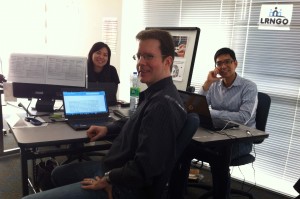I’ve been asked by quite a few people in the past two weeks about our experience so far in Ignition, the new startup incubator at the Houston Technology Center, so I thought I’d say a few quick words.
My response thus far is very favorable, and I know we are getting a lot out of the program. Quite honestly, this program came along just in time for us. Being our first tech startup, we had already resigned ourselves to the fact that we would need help and quite a bit of intensive training, and were preparing to look into options out of state. Not that there aren’t already great mentors here, but having access to many experts was really what we were after, and the fact that we are going through the program with others is very helpful. This is not just because of the built in interaction we get when we’re learning from each other, but also the opportunity to learn daily through observation.
I can’t overstate how difficult it is at first to take a step back out of your own “startup zone” and get an external perspective when problem solving (particularly concerning communication), and sometimes watching others working through the same kinds of problems and issues can really help. It was a real eye opener to see that in most cases when we first started three weeks ago, we could explain each others businesses more accurately in two sentences than we could our own.
As for the mentors, when you get down to it, it’s much like a university. There are some who have just the experience you need and you hang on every word, and then there are some who may be in completely different industries and might never get what you’re trying to do. However, one of the things I’ve learned over the last three weeks is how much even the latter can have value. There’s something to be said for being able to communicate with and peak the interest of someone who isn’t one bit interested in the internet, but is still interested in your business proposition, and getting the general public excited about your product is clearly a valuable exercise. Besides, they may have an acquaintance in your industry–and whether for investment purposes or just to spread the word about your product, you will want to be the topic of their next conversation.
I must admit that adding involvement in a boot camp that forces us to convert a business plan into a lean canvas, perfect the pitch, refine the go-to-market strategy, and completely rework the financial modeling to an already grueling product development and website launch schedule can be challenging–but every time I think our team has bitten off too much, I remind myself that it’s likely the best practice possible for the kind of schedule we will be dealing with in the days ahead. And while it’s true that we still have a lot to learn, I can safely say that after three weeks we are way ahead of where we were. Of course there are never any guarantees, and this is especially true when it comes to tech startups–but three weeks in, what do I think? Ok, here’s the lowdown. Lots of hard work and lots of fun, but mostly it lights a bit of a fire when you know you’re not the only one out there building something. In fact, when you get enough architects together, the buildings start to improve the whole city and take on a life of their own. It’s an exciting time in Houston.
Photo Credits: Lucy Ayala
